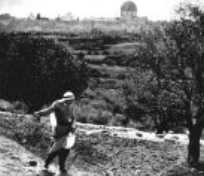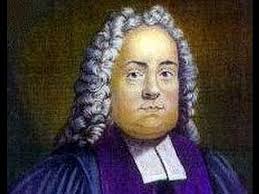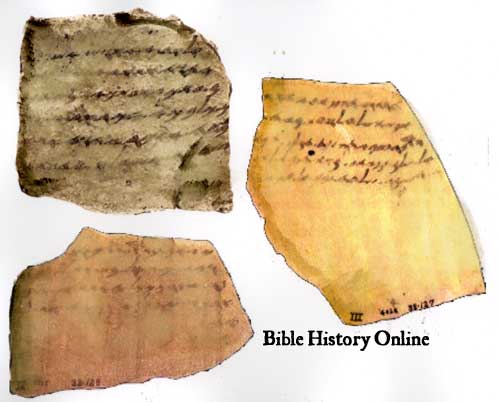|
Online links to scriptures (New International Version [NIV] unless otherwise stated) are shown in blue
| The Narrow and Wide Gates
13 “Enter through the narrow gate. For wide is the gate and broad is the road that leads to destruction, and many enter through it. 14 But small is the gate and narrow the road that leads to life, and only a few find it. |
|
|
| EXPOSITION: |
|
 There are two ways of life, represented by the two gates. The majority will enter the wide gate of easy living which leads to hell. The minority will choose a life of change, of trial and testing, in order to finally conform to the image of Jesus. It is these faithful ones who will receive their eternal heavenly reward. There are two ways of life, represented by the two gates. The majority will enter the wide gate of easy living which leads to hell. The minority will choose a life of change, of trial and testing, in order to finally conform to the image of Jesus. It is these faithful ones who will receive their eternal heavenly reward.
|
|
|
 Most things in life, I do wholeheartedly. For that is my nature. If I commit to something, I will, most times, give it my all. Most things in life, I do wholeheartedly. For that is my nature. If I commit to something, I will, most times, give it my all.
In coming to Jesus, in my forties, I had come to the end of my natural, human tether.
Walking on the wide road was easy in many ways, although I still tripped up many times. I had plenty of company! It was downhill all the way. Downhill to destruction!
My way hadn't worked. I needed to make a new start. I chose to commit my life to Jesus.
|
|
|
 I chose to enter the narrow gate. I have found that the narrow way crosses mountains and valleys for which I have had to become spiritually fit in order to walk. At times I fall off the side of the road, for it is indeed narrow, and have to pull myself, through God's grace, back onto the path. Trials and testings abound. Being honest, it is hard at times. But the mountain top experiences are incredible and make the valleys bearable for they form an inevitable part of mountain climbing, both in the natural and the spiritual. I chose to enter the narrow gate. I have found that the narrow way crosses mountains and valleys for which I have had to become spiritually fit in order to walk. At times I fall off the side of the road, for it is indeed narrow, and have to pull myself, through God's grace, back onto the path. Trials and testings abound. Being honest, it is hard at times. But the mountain top experiences are incredible and make the valleys bearable for they form an inevitable part of mountain climbing, both in the natural and the spiritual.
There is however, another way in which these verses can be applied. That is, in regards to Christians. Many Christians take the path of 'easy Christianity', where they make a decision for Jesus yet continue to live their lives mainly in the world. In other words, become believers, but not disciples.
There are a number of references in the parables of Jesus. A few are, the Parable of the Sower, the Wise and Foolish Virgins and Parable of the Talents.
In each case, believers are split into categories, and the frightening part is, in each case, apparent believers who have not become disciples, are consigned to hell.
Matthew 13:12b, 25:12, 25:30
|
|
|
"Lord, may I be faithful to you in all that I do."
|
| A Tree and Its Fruit
15 “Watch out for false prophets. They come to you in sheep’s clothing, but inwardly they are ferocious wolves. 16 By their fruit you will recognize them. Do people pick grapes from thornbushes, or figs from thistles? |
|
|
| 17 Likewise every good tree bears good fruit, but a bad tree bears bad fruit. 18 A good tree cannot bear bad fruit, and a bad tree cannot bear good fruit. 19 Every tree that does not bear good fruit is cut down and thrown into the fire. |
|
|
| 20 Thus, by their fruit you will recognize them. (Matthew 7:15-20) |
|
|
| EXPOSITION: |
|
 The scriptural application is to all the 5 fold ministry, not just prophets. In the illustration, the fruit bearing trees are of two types, those producing good, and those producing bad, fruit. What distinguishes the two? Matthew Henry comments, If the doctrine be of God, it will tend to promote serious piety, humility, charity, holiness, and love, with other Christian graces; but if, on the contrary, the doctrines these prophets preach have a manifest tendency to make people proud, worldly, and contentious, to make them loose and careless in their conversations, unjust or uncharitable, factious or disturbers of the public peace; if it indulge carnal liberty, and take people off from governing themselves and their families by the strict rules of the narrow way, we may conclude, that 'this persuasion comes not of him that calleth us', (Gal. 5:8) Henry, Matthew, Matthew Henry’s Commentary on the Bible, (Peabody, MA: Hendrickson Publishers) 1997. Those who promote false doctrines will end up in hell. The scriptural application is to all the 5 fold ministry, not just prophets. In the illustration, the fruit bearing trees are of two types, those producing good, and those producing bad, fruit. What distinguishes the two? Matthew Henry comments, If the doctrine be of God, it will tend to promote serious piety, humility, charity, holiness, and love, with other Christian graces; but if, on the contrary, the doctrines these prophets preach have a manifest tendency to make people proud, worldly, and contentious, to make them loose and careless in their conversations, unjust or uncharitable, factious or disturbers of the public peace; if it indulge carnal liberty, and take people off from governing themselves and their families by the strict rules of the narrow way, we may conclude, that 'this persuasion comes not of him that calleth us', (Gal. 5:8) Henry, Matthew, Matthew Henry’s Commentary on the Bible, (Peabody, MA: Hendrickson Publishers) 1997. Those who promote false doctrines will end up in hell.
|
| TESTIMONY: |
|
 For those involved in Christian 'ministry' (that is, all of us!) this passage is a timely reminder of the need to be so careful in what we speak, teach or preach. For those involved in Christian 'ministry' (that is, all of us!) this passage is a timely reminder of the need to be so careful in what we speak, teach or preach.
While no one person has 100% of the truth, and inevitably, there will be one or two rotten or deformed fruit on our 'tree', as there is in the natural also. we are to be known by the good fruit in our life. In reality, by what we do rather than what we say, or say we do!
The problem in preaching and teaching is that we want to give a 'good' sermon or teaching. It is so tempting to 'spice it up' with words that stray from the truth. Maybe just a little to start off with, but more and more as time goes on.
For me personally, I have had to consider whether the 'revelations', the teachings you find in the 'David's Downloads' section of PGIM are truly from God, or from my imagination.
|
|
|
 Ironically, in a way, I have had an advantage - perhaps you may say, a dangerous advantage! For I have had little theological training. At the time of writing these I was spending many hours reading the Bible through and through from cover to cover. While I have a lousy memory when it comes to learning verses, or even knowing where specific verses are found, I did build up a good overall understanding of Biblical principles. When the Lord gave me a revelation or inspiration about a particular subject, I was then able to search out the detail, line upon line, scripture upon scripture, to produce the teachings. As a confirmation, I have always had the teachings checked out by people more qualified and experienced than I in theological matters. For I have always been aware of wanting to be accurate scripturally in my writing. Ironically, in a way, I have had an advantage - perhaps you may say, a dangerous advantage! For I have had little theological training. At the time of writing these I was spending many hours reading the Bible through and through from cover to cover. While I have a lousy memory when it comes to learning verses, or even knowing where specific verses are found, I did build up a good overall understanding of Biblical principles. When the Lord gave me a revelation or inspiration about a particular subject, I was then able to search out the detail, line upon line, scripture upon scripture, to produce the teachings. As a confirmation, I have always had the teachings checked out by people more qualified and experienced than I in theological matters. For I have always been aware of wanting to be accurate scripturally in my writing.
Incidentally, knowledge and understanding are two quite different things. We can know a lot but understand little. I will never forget the time I conducted some meetings in Benin City in Nigeria. Some teachers from a local Bible Seminary came along, more than a little skeptical about this 'kiwi'. They mellowed. After the meetings however, one of the men came up to me, A Doctor of Theology, and told me that he had studied the Bible for many years, had tremendous knowledge of it which he taught to others, yet this seminar was the first time he had truly gained a real understanding of what the Bible was really all about. This has been repeated elsewhere also. For theology is based on knowledge while understanding is grounded in relationship.
While it is good to have revelation, the most important truth, as shared by Jesus in this illustration of the tree and its fruit, is living life according to the example of Jesus. The 'fruit of the Spirit' are an obvious parallel.
Galatians 5:22-3
|
|
|
Does my life exhibit these? You had better ask Jesus. Or my wife! Many times it does, other times it doesn't.
Summing up:
Our best sermon is our life.
|
| <i>NEXT WEEK:</i> SERMON ON THE MOUNT continues... |
|
 ... as we look at the 'tares'. ... as we look at the 'tares'.
|
| A NOTE FROM DAVID |
|
 Our best sermon is our life! Our best sermon is our life!
There is little more to be said!
If we don't live the life we aren't a true follower of Jesus.
BIBLE ARCHAEOLOGY
Lachish Letters
Did the Lachish letters reveal the turmoil in Judah just before the Babylonian captivity?
The discovery of the Lachish Letters in 1935 of eighteen ostraca (clay tablets with writing in ink) written in an ancient Hebrew script, from the 7th century BC reveal important information concerning the last days of the southern kingdom of Judah.
They were discovered at Lachish (Tell ed-Duweir) among the ruins of an ancient guard room just outside the Lachish city gate.
Then a few years later three inscribed potsherds were also found at the site, and like the others, they contained names and lists from the period just before the fall of Jerusalem in 586 BC.
Most of the letters were dispatches from a Jewish commander named Hoshaiah who was stationed at an outpost north of Lachish, who apparently was responsible for interpreting the signals from Azekah and Lachish during the time when the Babylonians came against Jerusalem:
Jer 34:7 "when the king of Babylon's army fought against Jerusalem and all the cities of Judah that were left, against Lachish and Azekah; for only these fortified cities remained of the cities of Judah."
The ostraca read: "To my lord Ya'osh. May Yahweh cause my lord to hear the news of peace, even now, even now. Who is your servant but a dog that my lord should remember his servant?'"
These final communications which mentioned the political and religious turmoil of the last days of Judah reveal the intensity of this time period and confirm that which was written in the Bible by the prophet Jeremiah.
The Lachish Letters are an important discovery in the study of Biblical Archaeology and shed much light on the last days of Judah.
|
So until next week.......
MAY GOD BLESS YOU AND YOU BLESS GOD!
His servant and yours

Learn more about us at...
www.wwj.org.nz/about.php
|
A DAVID'S DOODLING
3. The foolish deny God; the wise acknowledge Him, while the godly experience their God.
David Tait
|
Check
out the WWJ website for….
More David's Doodlings: www.wwj.org.nz/dd.php
If Only I'd Thought of it: http://www.wwj.org.nz/thought.php
Laughing at Ourselves: http://www.wwj.org.nz/laugh.php
A look at some of lifes curious questions: http://www.wwj.org.nz/why.php
Everything you ever wanted to know about....: http://www.wwj.org.nz/exex.php
|

 There are two ways of life, represented by the two gates. The majority will enter the wide gate of easy living which leads to hell. The minority will choose a life of change, of trial and testing, in order to finally conform to the image of Jesus. It is these faithful ones who will receive their eternal heavenly reward.
There are two ways of life, represented by the two gates. The majority will enter the wide gate of easy living which leads to hell. The minority will choose a life of change, of trial and testing, in order to finally conform to the image of Jesus. It is these faithful ones who will receive their eternal heavenly reward.  Most things in life, I do wholeheartedly. For that is my nature. If I commit to something, I will, most times, give it my all.
Most things in life, I do wholeheartedly. For that is my nature. If I commit to something, I will, most times, give it my all. I chose to enter the narrow gate. I have found that the narrow way crosses mountains and valleys for which I have had to become spiritually fit in order to walk. At times I fall off the side of the road, for it is indeed narrow, and have to pull myself, through God's grace, back onto the path. Trials and testings abound. Being honest, it is hard at times. But the mountain top experiences are incredible and make the valleys bearable for they form an inevitable part of mountain climbing, both in the natural and the spiritual.
I chose to enter the narrow gate. I have found that the narrow way crosses mountains and valleys for which I have had to become spiritually fit in order to walk. At times I fall off the side of the road, for it is indeed narrow, and have to pull myself, through God's grace, back onto the path. Trials and testings abound. Being honest, it is hard at times. But the mountain top experiences are incredible and make the valleys bearable for they form an inevitable part of mountain climbing, both in the natural and the spiritual.  The scriptural application is to all the 5 fold ministry, not just prophets. In the illustration, the fruit bearing trees are of two types, those producing good, and those producing bad, fruit. What distinguishes the two? Matthew Henry comments, If the doctrine be of God, it will tend to promote serious piety, humility, charity, holiness, and love, with other Christian graces; but if, on the contrary, the doctrines these prophets preach have a manifest tendency to make people proud, worldly, and contentious, to make them loose and careless in their conversations, unjust or uncharitable, factious or disturbers of the public peace; if it indulge carnal liberty, and take people off from governing themselves and their families by the strict rules of the narrow way, we may conclude, that 'this persuasion comes not of him that calleth us', (Gal. 5:8) Henry, Matthew, Matthew Henry’s Commentary on the Bible, (Peabody, MA: Hendrickson Publishers) 1997. Those who promote false doctrines will end up in hell.
The scriptural application is to all the 5 fold ministry, not just prophets. In the illustration, the fruit bearing trees are of two types, those producing good, and those producing bad, fruit. What distinguishes the two? Matthew Henry comments, If the doctrine be of God, it will tend to promote serious piety, humility, charity, holiness, and love, with other Christian graces; but if, on the contrary, the doctrines these prophets preach have a manifest tendency to make people proud, worldly, and contentious, to make them loose and careless in their conversations, unjust or uncharitable, factious or disturbers of the public peace; if it indulge carnal liberty, and take people off from governing themselves and their families by the strict rules of the narrow way, we may conclude, that 'this persuasion comes not of him that calleth us', (Gal. 5:8) Henry, Matthew, Matthew Henry’s Commentary on the Bible, (Peabody, MA: Hendrickson Publishers) 1997. Those who promote false doctrines will end up in hell.  For those involved in Christian 'ministry' (that is, all of us!) this passage is a timely reminder of the need to be so careful in what we speak, teach or preach.
For those involved in Christian 'ministry' (that is, all of us!) this passage is a timely reminder of the need to be so careful in what we speak, teach or preach.  Ironically, in a way, I have had an advantage - perhaps you may say, a dangerous advantage! For I have had little theological training. At the time of writing these I was spending many hours reading the Bible through and through from cover to cover. While I have a lousy memory when it comes to learning verses, or even knowing where specific verses are found, I did build up a good overall understanding of Biblical principles. When the Lord gave me a revelation or inspiration about a particular subject, I was then able to search out the detail, line upon line, scripture upon scripture, to produce the teachings. As a confirmation, I have always had the teachings checked out by people more qualified and experienced than I in theological matters. For I have always been aware of wanting to be accurate scripturally in my writing.
Ironically, in a way, I have had an advantage - perhaps you may say, a dangerous advantage! For I have had little theological training. At the time of writing these I was spending many hours reading the Bible through and through from cover to cover. While I have a lousy memory when it comes to learning verses, or even knowing where specific verses are found, I did build up a good overall understanding of Biblical principles. When the Lord gave me a revelation or inspiration about a particular subject, I was then able to search out the detail, line upon line, scripture upon scripture, to produce the teachings. As a confirmation, I have always had the teachings checked out by people more qualified and experienced than I in theological matters. For I have always been aware of wanting to be accurate scripturally in my writing.  ... as we look at the 'tares'.
... as we look at the 'tares'.  Our best sermon is our life!
Our best sermon is our life! 